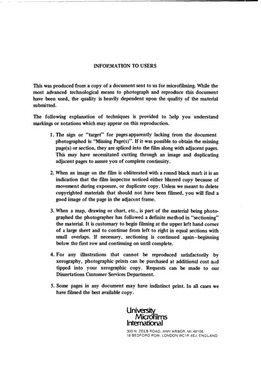| dc.contributor.author | Yunis, Abla Malhas, | en_US |
| dc.date.accessioned | 2013-08-16T12:28:00Z | |
| dc.date.available | 2013-08-16T12:28:00Z | |
| dc.date.issued | 1980 | en_US |
| dc.identifier.uri | https://hdl.handle.net/11244/4713 | |
| dc.description.abstract | In order to try to insure the efficient transfer of wastewater reuse technology into the society, the author sets up an interdisciplinary model for approaching this development problem. This approach is based on an important new conception of the term development. In this study, the author has redefined development as the on-going interaction process between water (other resources), society (demographic, socio-economic, and social organization), environment (pollution), and technology. In other words, water adequacy, its technological solution and impact, is viewed as an interdisciplinary problem, built into the ongoing system of interaction in the development process. | en_US |
| dc.description.abstract | This dissertation then postulates the potential social impact of wastewater reuse technology for irrigation programmed from the start to overcome societal constraints. It perceptually compares two alternative futures in the development process for the region: (1) The future development process without wastewater reuse as extrapolated from the present on-going interaction process, and (2) an alternative future with wastewater reuse derived from the present on-going interaction process. To substantiate these impacts the author uses two historical scenarios from the U.S.A. and Mexico and the Delphi-technique. The impacts are conceptualized as two dimensional: (1) The societal constraint resolution, and (2) the resultant social impact. | en_US |
| dc.description.abstract | Because of the continuing changes in the society and the demand of development, the arid countries of the Arab-Asian region face a serious water shortage problem. This dissertation analyzes the problem projecting the likelihood of it solution in view of the current trends as well as the technological measures used in dealing with it. Then this study offers an alternative solution in the technology of wastewater reuse for agriculture, a rich source of water that is currently being wasted in the region. | en_US |
| dc.description.abstract | This study establishes that wastewater reuse technology will have beneficial impacts on social concerns in the region and that successful diffusion of the technology depends on putting high priority on resolving societal constraints at the rural level in the programming of that technology. In other words, water problem in the region is an integral part of a system of interaction in the development process. | en_US |
| dc.format.extent | xiv, 265 leaves : | en_US |
| dc.subject | Engineering, General. | en_US |
| dc.subject | Energy. | en_US |
| dc.title | The effect of reuse of water for agriculture on the Arab-Asian society : | en_US |
| dc.type | Thesis | en_US |
| dc.thesis.degree | Ph.D. | en_US |
| dc.thesis.degreeDiscipline | School of Civil Engineering and Environmental Science | en_US |
| dc.note | Source: Dissertation Abstracts International, Volume: 41-02, Section: B, page: 0621. | en_US |
| ou.identifier | (UMI)AAI8016939 | en_US |
| ou.group | College of Engineering::School of Civil Engineering and Environmental Science | |
